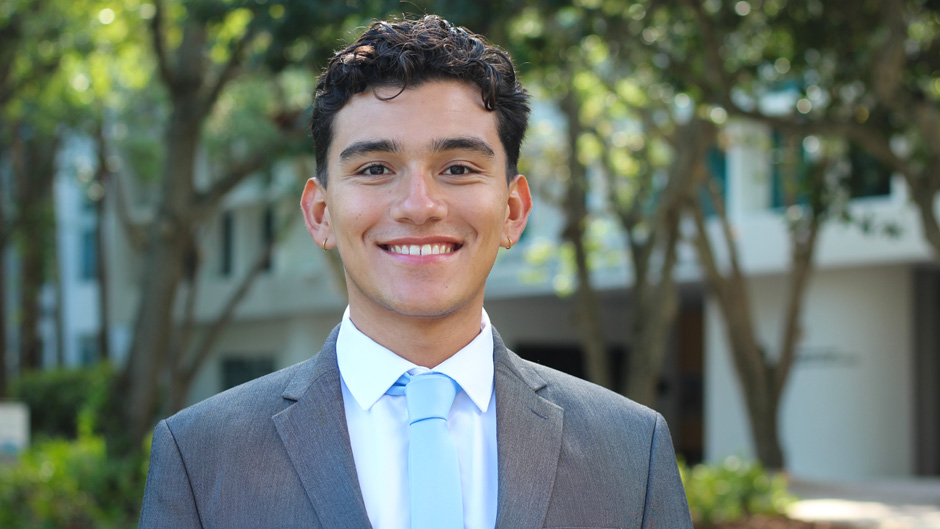Juan Perez Pachon traces his fascination with the human body back to when he was just 6-years-old, growing up in Bogotá, Colombia, and his mother was pregnant with his younger brother. At night she would read to him about fetal development, and young Juan was captivated by learning how the baby was moving and developing within the womb.
That fascination continued to grow and, years later, when it came time for college, his decision to explore the human sciences was a clear choice. The University of Miami School of Education and Human Development Exercise Physiology program, which offered courses in anatomy, physiology, and nutrition, especially ignited his interest.
Perez, whose family now lives in Charlotte, North Carolina, will graduate this May with a Bachelor of Science in Education, complemented by minors in American Sign Language and psychology.
In addition to your studies, in what ways have you been involved at the University?
I am a teaching assistant for both basic anatomy and gross anatomy courses offered for exercise physiology majors. For a long time, I was a chemistry workshop leader where I taught small group practice sessions in general and organic chemistry topics. I stepped up into the chemistry workshop coordinator position, where I now oversee workshop leaders and help run the program. One of my favorite involvements is as a President's 100 student ambassador, commonly known as campus tour guides. Lastly, for the past year I served as the president of the University’s American Sign Language Club.
Who or what has made a significant impact on your collegiate career at the U?
Several instructors have served as incredible mentors for my academic development. Leslie Knecht and Cesar Gonzalez, both lecturers in the Department of Chemistry, and Daniel Serravite and current Ph.D. candidate Valeria Vendries in kinesiology have helped me see how passion drives success. They are all passionate about what they teach and what they do, and it truly shows. I have learned to reflect my own passion in my lessons and involvements, because that is when they become the most meaningful. Professor Vendries has been especially instrumental, as she has taken time to teach me cadaveric dissection techniques as part of my role as a teaching assistant for gross anatomy, a class she instructs. This is an opportunity I could only have dreamed of doing at the undergraduate level, and one that I am very grateful for.
View photos and videos from commencement ceremonies from our multimedia coverage.
Readstudent profiles and find commencement ceremony info in our special report.
What accomplishment or experience are you most proud of?
It’s truly hard to choose, but one that comes to mind is becoming a P100. I applied with a clear purpose: to be able to provide tours for Spanish-speaking families. My father, who does not speak English, missed out on my tour of UM back when I was applying. As immigrants, we had little to no understanding of the American college experience, so a tour was key to making a confident decision about my education. I became a “P” to help other families in similar situations. Providing them a full understanding of our school, answering their concerns, and doing so in a language they feel comfortable in is a very gratifying accomplishment.
Do you have a favorite campus experience, tradition, memory, or venue?
My favorite UM memory/experience was meeting the people who lived in my hallway in my first-year dorm. My roommate and the people across the hall became my best friends. During that first year, we did everything together, from sunrise to sunset. Since then, the bond has kept growing and growing. We see each other daily, have visited each other's hometowns, and just recently took our graduation pictures together. I consider them my best friends and know we will be bonded for the rest of our lives. They are truly my biggest gift from all that I have gotten from my experience here at the U.

